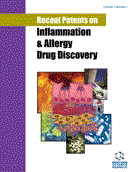Abstract
Seasonal allergic rhinitis is characterized by seasonal rhinorrhea, nasal congestion/stuffiness, nasal and ocular pruritus, and paroxysmal sneezing. Allergen avoidance is the first step in the management. Symptomatic relief and improved quality of life can be achieved in the majority of patients by the appropriate use of pharmacotherapy. Mild to moderate cases can be managed with either an oral/intranasal second generation antihistamine or an intranasal corticosteroid alone. More severe cases may require treatment with an intranasal corticosteroid in combination with various agents. Patients who require medications for more than 6 months per year, two or more seasons of unacceptable pollinosis, or have intolerable side effects from pharmacotherapy, especially those with co-morbid conditions are candidates for immunotherapy. This review article also discusses recent patents related to the field.
Keywords: Allergen avoidance, combination therapy, immunotherapy, intranasal corticosteroid, oral antihistamine, pharmacotherapy, seasonal allergic rhinitis.
Recent Patents on Inflammation & Allergy Drug Discovery
Title:Seasonal Allergic Rhinitis
Volume: 7 Issue: 3
Author(s): Alexander K.C. Leung and Kam-lun E. Hon
Affiliation:
Keywords: Allergen avoidance, combination therapy, immunotherapy, intranasal corticosteroid, oral antihistamine, pharmacotherapy, seasonal allergic rhinitis.
Abstract: Seasonal allergic rhinitis is characterized by seasonal rhinorrhea, nasal congestion/stuffiness, nasal and ocular pruritus, and paroxysmal sneezing. Allergen avoidance is the first step in the management. Symptomatic relief and improved quality of life can be achieved in the majority of patients by the appropriate use of pharmacotherapy. Mild to moderate cases can be managed with either an oral/intranasal second generation antihistamine or an intranasal corticosteroid alone. More severe cases may require treatment with an intranasal corticosteroid in combination with various agents. Patients who require medications for more than 6 months per year, two or more seasons of unacceptable pollinosis, or have intolerable side effects from pharmacotherapy, especially those with co-morbid conditions are candidates for immunotherapy. This review article also discusses recent patents related to the field.
Export Options
About this article
Cite this article as:
Leung K.C. Alexander and Hon E. Kam-lun, Seasonal Allergic Rhinitis, Recent Patents on Inflammation & Allergy Drug Discovery 2013; 7 (3) . https://dx.doi.org/10.2174/1872213X113079990022
| DOI https://dx.doi.org/10.2174/1872213X113079990022 |
Print ISSN 1872-213X |
| Publisher Name Bentham Science Publisher |
Online ISSN 2212-2710 |
 42
42Related Articles
-
Drug-Induced Aseptic Meningitis
Current Drug Targets - Immune, Endocrine & Metabolic Disorders Role of Renin Angiotensin System Inhibitors in Cardiovascular and Renal Protection: A Lesson from Clinical Trials
Current Pharmaceutical Design Inhibition of Zinc Metallopeptidases in Cardiovascular Disease - From Unity to Trinity, or Duality?
Current Pharmaceutical Design Histamine-Dependent and -Independent Hypersensitivity Reactions to Contrast Media: The Impact of Antihistamines
Anti-Inflammatory & Anti-Allergy Agents in Medicinal Chemistry Review of Newer Anticoagulants and Anti-platelet Agents in Acute Coronary Syndrome and Cardiovascular Diseases
Cardiovascular & Hematological Agents in Medicinal Chemistry Isolated Perioperative Hypertension: Clinical Implications & Contemporary Treatment Strategies
Current Hypertension Reviews The Renin Inhibitor Aliskiren as Novel Treatment for Cardiovascular Disease
Recent Patents on Cardiovascular Drug Discovery An Update on the Management of Severe Cutaneous Drug Hypersensitivity Reactions
Current Pharmaceutical Design Immediate Hypersensitivity Reactions to Penicillins and Other Betalactams
Current Pharmaceutical Design Drug Hypersensitivity: Epidemiology and Risk Factors
Current Pharmaceutical Design C1 Inhibitor Administration Reduces Local Inflammation and Capillary Leakage, Without Affecting Long-term Wound Healing Parameters, in a Pig Burn Wound Model
Anti-Inflammatory & Anti-Allergy Agents in Medicinal Chemistry Clinical and Forensic Signs Related to Cocaine Abuse
Current Drug Abuse Reviews Evaluation of Allergic Reactions Following Intravenous Infusion of Polyvalent Antivenom in Snakebite Patients
Anti-Inflammatory & Anti-Allergy Agents in Medicinal Chemistry Ocular Inflammatory Diseases: Molecular Pathogenesis and Immunotherapy
Current Molecular Medicine New Challenges for ACE-Inhibitors in Vascular Diseases
Drug Design Reviews - Online (Discontinued) Seasonal Allergic Rhinitis
Recent Patents on Inflammation & Allergy Drug Discovery The Indian Pediatric HIV Epidemic: A Systematic Review
Current HIV Research Antibodies Against Complement System in SLE and their Potential Diagnostic Utility
Current Rheumatology Reviews Designing Peptidomimetics
Current Topics in Medicinal Chemistry Complications Associated with Recombinant Tissue Plasminogen Activator Therapy for Acute Ischaemic Stroke
CNS & Neurological Disorders - Drug Targets



















